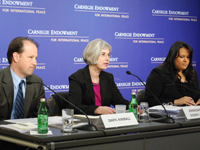Registration
You will receive an email confirming your registration.
In May 2010, nearly 190 nations will meet in New York City to assess the implementation of the Nuclear Non-Proliferation Treaty (NPT) and to chart a path forward for progress on its three pillars: nonproliferation, disarmament, and peaceful uses of nuclear energy.
U.S. Special Representative of the President for Nuclear Nonproliferation Ambassador Susan Burk presented and discussed U.S. goals for the conference and for the nonproliferation regime. Following her remarks, Carnegie’s Deepti Choubey described identified measures of success and Daryl Kimball from the Arms Control Association identified the critical issues for government officials, experts, and the media to watch in the lead up to and during the conference.
The Significance of the Review Conference
While the Review Conference is an important opportunity to stabilize and strengthen the nonproliferation regime, Choubey warned that participants and observers “shouldn’t make the mistake of casting this once every five year event as a make or break moment for the regime.” Rather, Choubey said, the NPT is a cornerstone of the broader nonproliferation regime. It serves as a set of norms, rules, institutions, and practices to prevent the spread of both nuclear weapons and the materials and knowledge necessary to develop those weapons.
The Obama Administration’s Approach
Ambassador Burk described the U.S. administration’s approach to the NPT. She highlighted the administration’s assessment that nuclear non-proliferation requires active participation from both nuclear-weapons states and non-nuclear-weapons states. The international community, she contended, must work together to encourage full compliance with the NPT and to address issues of non-compliance.
- The Role of Non-Nuclear-Weapons States: While nuclear-weapons states “bear a special responsibility for pursuing nuclear disarmament…non-nuclear-weapons states share this responsibility under Article VI,” stated Ambassador Burk. By working to maintain “robust and reliable” nonproliferation norms, non-nuclear-weapons states can help create the conditions for disarmament to proceed.
- The Additional Protocol: Burk said the United States would work to strengthen the international consensus “that the Additional Protocol represents the new international safeguards standard.”
- Withdrawals from the NPT: While the United States “contemplates no change to the Treaty or abridgment of the right to withdraw,” Burk also said the United States was working with treaty partners to develop ways to dissuade a party from withdrawing from the Treaty after violating its NPT obligations.
- Peaceful Uses of Nuclear Energy: Burk contended that the peaceful uses pillar “is more important today than ever.” She noted that President Obama “made clear that this must be the right of every nation that renounces nuclear weapons, especially developing countries embarking on peaceful programs.”
- The IAEA: As the body responsible for verifying compliance with the NPT, the IAEA must “be provided with the resources and authorities it needs to carry out its mandates.”
Recommendations for Success
Choubey and Kimball agreed that certain pressing issues will likely be at the forefront of the conference:
- Iran: The Review Conference should not be seen as a place to solve the problem of Iran’s noncompliance with its nonproliferation obligations, asserted Choubey.
- Withdrawing from the NPT: Kimball warned that the Review Conference’s consensus-based decision making process will make it difficult for states party to produce a concrete plan to address countries that wish to withdraw from the NPT even if they have been found to be in non-compliance.. However, he suggested that states party must at least agree to address without delay any notice of withdrawal. Some immediate responses might include:
- Convening a special session of the states party to discuss a collective response.
- Affirming that a state remains responsible under international law for violations of the NPT committed prior to withdrawal.
- The Additional Protocol: Many developing states oppose the universalization of the Additional Protocol, which would give the IAEA “important” additional powers to investigate undeclared nuclear activities. Kimball argued states party need to make further progress on convincing these states to adopt the Protocol. He suggested that all states that have yet to bring into force both comprehensive safeguards agreements and Additional Protocols should do so no later than 2015.
- Gauging the Conference’s Success: Choubey argued that states party should work together to develop new ways to gauge the success of the conference. These include:
- Elevating the significance of the President of the Review Conference's summary and using it as guidance moving forward. Choubey warned, however, that the Review process itself is in need of further reform to facilitate progress on substantive issues in the years between Review Conferences.
- Issuing a coordinated statement by the five permanent members of the Security Council showing common ground on disarmament and other issues.
- An announcement by a state that has yet to adopt the Additional Protocol that it will do so.
- Demonstrations of leadership by a set of states willing to begin the process of examining proposals for addressing withdrawal.
Choubey said one indirect marker of success will be how the narratives of possible “spoiler” states, such as Iran, are greeted by the NAM. Do they accept Iran's story or will they be more skeptical? If the latter, the Review Conference can be a place for non-nuclear-weapon states to send Iran a strong signal to return to negotiations and rebuild faith with the international community.
